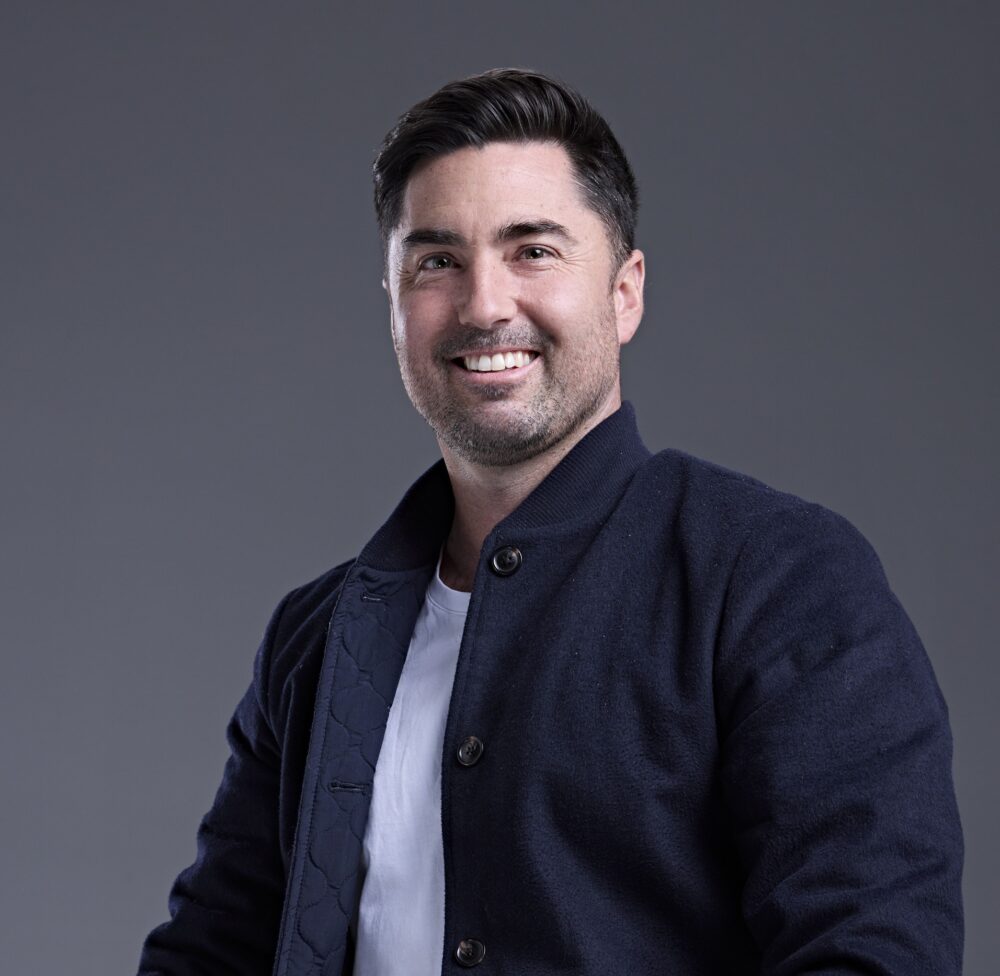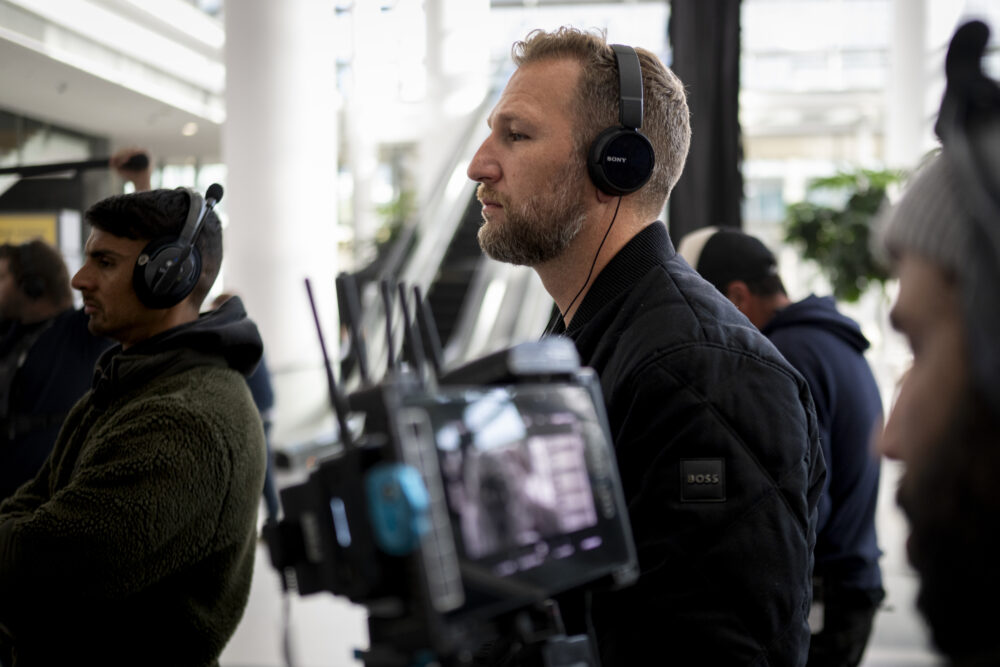Location, location: Josh Duhamel in a scene from the American action-comedy London Calling, which was shot in Cape Town. Photo: Julia Hansson
Like casting, soundtrack and wardrobe, location plays a vital role in enhancing a film’s tone and the viewing experience.
Over the years, Cape Town has been a sought-after film location for local and international filmmakers alike. Popular films such as Avengers: Age of Ultron, Mad Max: Fury Road, The Woman King and Safe House have been shot in and around the city.
The team at South African independent film production company Mannequin know all there is to know about shooting there.
Founded in 2007 by partners Delon Bakker and Kyle Ambrose, and later joined by Morgan Pather, Mannequin is a vertically integrated film group spanning development, financing, production and physical production services.
I arrived at their offices in Bryanston, Johannesburg, a bit early for our meeting. The boardroom becomes a refuge from the typing and phone calls in the open-plan office. The walls are plastered with posters from some of the films Mannequin has produced, including Rogue and the recently released London Calling, starring Josh Duhamel.
Sitting across from Bakker and Ambrose, is like speaking to one person. The 18-year friendship that started in film school is evident in their synergy, finishing each other’s sentences during the interview.
Having initially studied directing, over the years the duo have harnessed their skills in producing and running a film company.
Though the pair agree on the overlaps of their managerial titles in a growing South African film industry, they do have specific roles. Bakker is Mannequin’s chief executive officer, overseeing development, strategy and financing, while Ambrose is head of production, in charge of convincing international partners of the benefits of filming in South Africa.
The pair explained that Mannequin builds international relationships by seeking out interesting scripts and projects and establishing connections through those opportunities.
“Whilst we do produce local content, we do have a massive focus on producing for international use and that usually requires that talent comes from the United States and the United Kingdom,” says Bakker.
London comes to Cape Town
After convincing their international partners that Los Angeles could be recreated in Cape Town, the duo was able to bring the American action-comedy film London Calling to South Africa.
Bakker and Ambrose highlighted the city’s diverse landscapes as a pulling factor. This allowed it to double as various locations, including parts of London, LA and even the Californian desert.
“When we stumbled across the script, we really liked it, but we saw it was set in LA and we said, ‘Well, you know, you can shoot LA in Cape Town.’ They were sceptical at first, but quickly started to see the potential. We helped to structure the budget then we shot the film in December 2023,” Ambrose says. But they said, ‘South Africa can’t be America.’
The filming locations in Cape Town included areas in the vicinity of Hout Bay, Milnerton and Atlantis, which offer diverse backdrops within a short driving distance of each other.
“There are certain parts of the city centre that look like London and other parts that look like LA, where you can be driving on a freeway somewhere. All of these locations are within maybe a 45-minute drive,” Ambrose adds.
 Action: Kyle Ambrose is an owner of the South African independent film production company Mannequin. Photos: Mannequin
Action: Kyle Ambrose is an owner of the South African independent film production company Mannequin. Photos: Mannequin
Filming challenges and casting local talent
Besides the fluctuating exchange rate between the rand and the dollar being a challenge regarding budgeting, with filming London Calling in Cape Town, another key challenge was the city’s December peak tourist season. This led to restrictions on filming in the city centre from mid-December to early January, requiring careful scheduling.
“I mean, the tricky thing with Cape Town is it’s so busy in December because it’s a holiday town. The city centre gets a massive influx of tourists that come for the summer holidays.
“So, that was a challenge that we had to work around by building an effective shooting schedule around that and choose separate locations to make it happen,” Ambrose says.
In the statement to promote the film, Canadian director Allan Ungar says: “Each film comes with a unique set of obstacles and challenges, and while this one was no different, I have to say that it was still the most incredible filmmaking experience I’ve had to date.
“I was blessed with an incredible cast, an amazing crew and we made what I believe is a truly special film in a special place.”
Mannequin’s unique strategy, Bakker adds, involves producing local content while also focusing heavily on international productions.
He explained that with this approach they can use international projects to promote South African talent and develop the local industry.
London Calling stars some of Hollywood’s best, such as Josh Duhamel, Jeremy Ray Taylor, Rick Hoffman and Aidan Gillen.
The South African actors in the film include Arnold Vosloo, Dillon Windvogel, Brandon Auret and Ntlanhla Morgan Kutu.
“We handled a lot of the local casting in key roles but Josh and Jeremy were already attached when the project came to us.
“Part of the vision for the company is to really get talented South African actors like Brandon and Ntlanhla roles in movies like these and put them on the big screen with the hope they would become more recognisable with audiences internationally.
“So, it’s really about giving all these South African actors a lot of air time,” Bakker adds.
 Delon Bakker is one of the owners of the South African independent film production company Mannequin. Photos: Mannequin
Delon Bakker is one of the owners of the South African independent film production company Mannequin. Photos: Mannequin
Cape Town’s appeal as a filming destination
Cape Town is highly attractive for film shoots due to several factors, according to Bakker.
“Firstly, it’s one of the most beautiful places in the world. So, if you’re going to spend two or three months away from your family, you want to do it in a beautiful place.”
The second reason Bakker mentions is the highly skilled and experienced crews.
“Some of the film studios have been producing there for around 25 years. South African crews are well versed in the landscape of how Hollywood productions work and that has pulled it through.”
While Johannesburg was at the forefront of TV and film shoots in the 1980s, it carried an international stigma regarding safety, often necessitating significant security measures for high-profile productions.
The third reason, Bakker concludes, is Cape Town’s reputation as a well-run and safe city.
The availability of suppliers also makes logistics and shooting a manageable experience, compared to other locations in South Africa.
“All the suppliers being available means we have a lot of resources. Whereas locations like Limpopo, for instance, as beautiful as it is and probably with lots of untouched gems, there’s not much easy access to gear houses and crew,” Ambrose adds.
Activities such as hikes, wine farms and beaches makes filming in Cape Town a good work-play experience, solidifying its appeal.
The duo also indicated how lead actor Duhamel expressed his appreciation for filming in Cape Town, underscoring the positive experiences of the international cast and crew.
Having just wrapped up another film, yet to be announced to the industry, their next project action-thriller Muzzle: City of Wolves starring Aaron Eckhart will be released in November.
Bakker and Ambrose announce their next projects to be shot in
Cape Town will feature Oscar-winning actress Halle Berry and Scott Eastwood.
In essence, Cape Town’s diverse locations offer a “one-stop shop” for breathtaking backdrops, film-equipment suppliers, experienced crew and a bit of play. Bakker and Ambrose have worked well in finding the sweet spot for both local and international stories to be shot in one of Africa’s most beautiful cities.